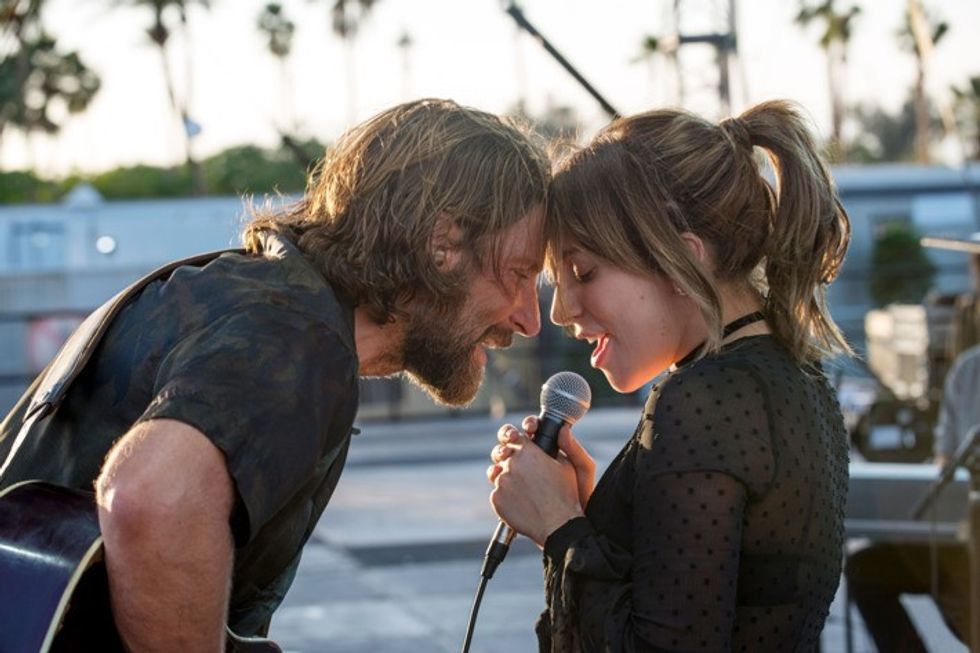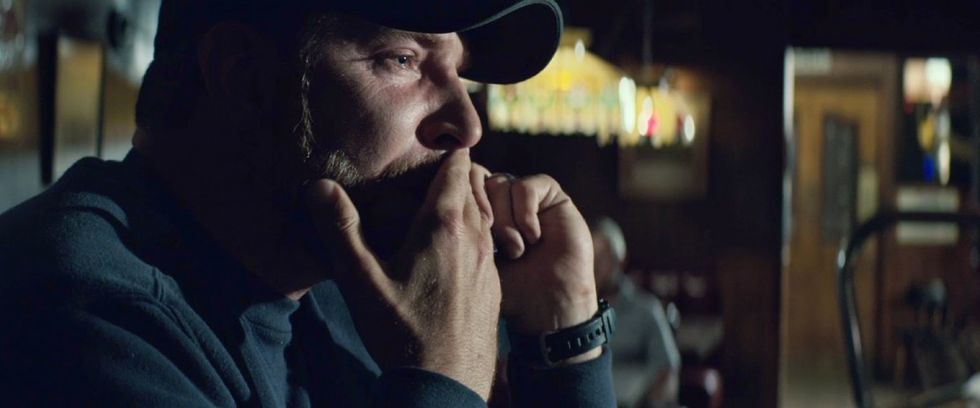David O. Russell, Robert De Niro, and Bradley Cooper on How to Capture Unexpected Emotional Moments
The three frequent collaborators sat down at the Tribeca Film Festival to break down their artistic collaborations.

Bradley Cooper and Robert De Niro have a lot in common, with both being beloved actors and the stars of Tribeca 2018’s most sold-out event: a conversation between the two (with a special surprise guest in the audience). While it may seem unnecessary to introduce these gentlemen, Tribeca co-chair Jane Rosenthal was there to provide a quick refresher. Cooper has been nominated by the Academy for his acting three years in a row (2013-2015) for Silver Linings Playbook, American Hustle, and American Sniper.
De Niro, Rosenthal said, “also has some acting chops.” Besides starring in countless classic movies, De Niro has won Oscars for his performances in both The Godfather: Part II and Raging Bull. If anything, De Niro and Cooper are known for their hard work and a relentless, meticulous concentration on craft.
They’re also a classic mentor-student combo, and, in some ways, a father-son duo beyond their onscreen relationships. At this event, the focus was on Cooper, with De Niro prompting career anecdotes and artistic insights from the 43-year old actor. But that’s only part of it: next October, Cooper will make his debut as both director and editor of A Star is Born, a remake of the 1954 musical-film of the same name. How did Cooper get to this watershed moment?

Build Your Confidence
Confidence was the foundation of Cooper’s career. “This business is so difficult, you need to find ways to build confidence,” he attested. For Cooper, his acting idol, De Niro, was one of them. “He really changed my life, impacted me in ways he never even knew.” De Niro’s eyebrows went up; Cooper grinned at his mentor.
Cooper traced it back to two essential moments. Their first encounter was when Cooper was studying acting at The New School. At a Q&A much like this one, a nervous young Cooper raised his hand to ask De Niro about his performance in Awakenings (1990)—was a certain moment drawn from the script or was it improvised? “Good question,” De Niro responded. “A lightning bolt shot through me,” Cooper admitted. “I didn’t sit back down, I just kept standing until they reminded me to sit.” He shook his head, flashed a smile. “Then I got the videotape of the Q&A from the school, and whenever things got tough, I’d watch it. I would tell myself ‘Look. Robert De Niro said that was a good question. Go with your gut.’ That alone kept me going for like three years.”
"Shots kept coming into my head. In a way, I realized I have to purge it.”
Later on, Cooper submitted an audition tape for the role of De Niro’s son in Everybody’s Fine (2009). De Niro saw the tape—and even though Sam Rockwell had already landed the role, he called Cooper in for a meeting. Cooper laughed in disbelief. “He called me in just to say, ‘You’re not gonna get the role, but I wanted you to come in, because I saw something. I see it now, and that’s it. Give me a hug.’ And we hugged, and I left. And that kept me going forever.”
Even now, at the peak of his career, Cooper welcomes a challenge. “Directing this latest project is about gaining confidence too,” he explained. “It’s about knowing that I have to try—whether I fail or not.” Directing isn’t an ego-boost for Cooper. It’s more about his obsession with storytelling. “This story, it kept haunting me, I would dream about it. Shots kept coming into my head. In a way, I realized I have to purge it.”

Prepare Your Voice
Purge it he did, and preparing his voice was key. “I find as I get older, voice is everything,” he stated, "When you can tap into a character’s voice, that to me is fuel.” What does he mean? According to Cooper, his first 10 years as an actor were just learning to be natural onscreen, to speak his lines from a place of authenticity. “I finally got to a place where I felt like I was really talking to other actors—but I hadn’t yet reached the scary part where I was actually inside a character.” That was his next goal: full immersion in a different mindset, someone with a different background, a different way of speaking… “The first time I had the opportunity to do that was with American Sniper.”
“I’m a better actor when there are tasks other than acting."
Cooper’s Oscar-nominated performance as the deadly sniper Chris Kyle wasn’t just a critical success, but a personal one. “Other than the fact that we’re males the same age with the same shoe size, Chris Kyle couldn’t be farther from me,” Cooper laughed. “I told Clint [Eastwood], if I can’t get to a place where I believe I’m him, I can’t do the movie.” Needless to say, he got there, but it took time.
“The more you stretch yourself, the more time it takes to prepare,” Cooper vouched. “It took me a year to get inside Chris Kyle’s head. A Star Is Born is an even farther stretch, so it took me three years. The next movie might even be 10 years.”
For A Star is Born, Cooper assembled a star-studded cast, including Lady Gaga, Andrew Dice Clay, Dave Chappelle, and Sam Elliot. Co-star Lady Gaga—whom Cooper calls ‘Stephanie’—insisted on a barter when she joined the project. She said, “I can’t stand movies with lip sync; I always notice. So I’ll make sure you become a musician if you help me become an actor.”
No surprise that Cooper rose to the occasion. “I really relied on her. I spent a year-and-a-half taking vocal lessons, singing in front of people. We went to real concert venues, music festivals, and I just jumped onstage for four or five minutes to sing for 25,000 people.”
De Niro, well-known for his own ascetic acting practices, nodded in quiet approval. “I’m a better actor when there are tasks other than acting,” Cooper grinned. “I felt so nourished doing Elephant Man, [on Broadway in 2014] because his physical state took so much of my brain and body, the emotional place was easy to get to since I wasn’t really living in my head. I had moments where I would surprise myself.”
Trust Your Instincts
As Cooper matured, he learned: preparation is crucial, but there’s always the point where you have to let your instincts take over. “You want your instinct to be embedded in the work so that you know exactly what story you’re going to tell.”
In an instinctive moment, Cooper and De Niro peer-pressured David O. Russell—the Academy Award-winning director of Silver Linings Playbook (2012) and American Hustle (2013)—to leave his seat in the crowd and join them onstage. This helped their talk segue from acting to directing, and the need to accept the unexpected. “Sometimes there can be these unexpected, emotional moments,” Russell reminded them. “When it happens, you can’t protect yourself. They can be really special: a chance for everyone to get outside of their own head. And oftentimes, those moments wind up in the movie.”
“I knew there would be a moment when Chris breaks, but I didn’t know it would be in the bar. It just happened."
Cooper nodded, remembering, “You never have to push. If you’ve prepared and you truly inhabit your role, those moments will happen.” One of them occurred in one of American Sniper's Oscar-worthy scenes, when Cooper’s character tilts the brim of his hat to conceal his tears.
“I knew there would be a moment when Chris breaks, but I didn’t know it would be in the bar. It just happened,”Cooper shared, "and because I was actually so terrified of people seeing me cry, I put the hat down over my head. I didn’t think Chris wanted to be seen crying.”
Silver Linings Playbook had its own special moments. “I started off with a few extreme mannerisms, which David helped me strip away until I was no longer acting,” Cooper explained. “Just the character was left.” This movie was particularly special for him because his father had just passed away. “Bob was the same age as my dad.” Cooper looked at his co-star, almost wistful. “That experience was part of why I grew so close to you, why I love you so, because I got to call you ‘dad’ so much. I owe David my life for that.”
That film was a healing process for both Cooper and De Niro. De Niro had lost his own father two decades earlier, and was “re-discovering” him by making a documentary about the man and his art, Remembering The Artist: Robert De Niro, Sr. (2014). Undoubtedly, the onscreen chemistry with his fictional son, Cooper, was cathartic for him as well. “That movie was so special and we all felt it every day on set,” Cooper smiled.
"That’s the best thing about making a film, when your whole crew becomes family."
Reportedly, cast members were legitimately frightened by De Niro’s performance as the abrasive father. This made it all the more affecting when, in an unscripted moment, De Niro’s character breaks down and cries. “It was just one of those moments,” De Niro demurred, always quick to share credit. “The way David directs is a full-contact sport. When he turns it on, to be there in real life, it is terrifying.”
Even after shooting was over, the three of them spent hours in the editing room—and now, up on stage, the trio looked like family. Russell gave a gleeful grin, “That’s the best thing about making a film, when your whole crew becomes family. These guys have been so generous to me.” Cooper laughed back, recalling all the hours of extensive advice, all the notes that these two men had given him, both for his acting and for his directorial debut.
Cooper beamed with gratitude. “That’s the best part of all of this, the camaraderie. I’d always read about it, but these guys made it my reality: to have people willing to help me create art, to be collaborators, without personal gain. That’s movie magic.”
For more information on the 2018 Tribeca Film Festival, click here.











